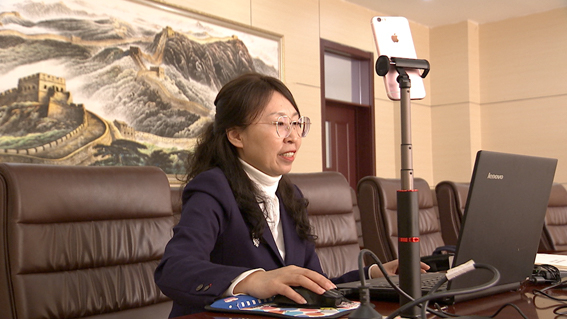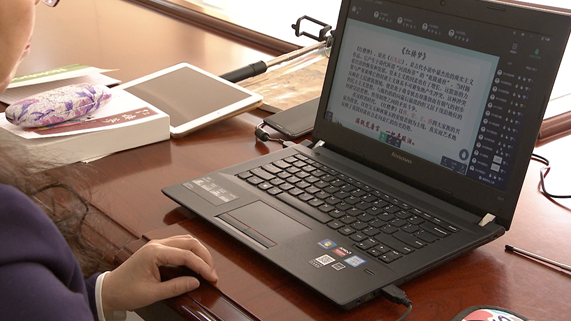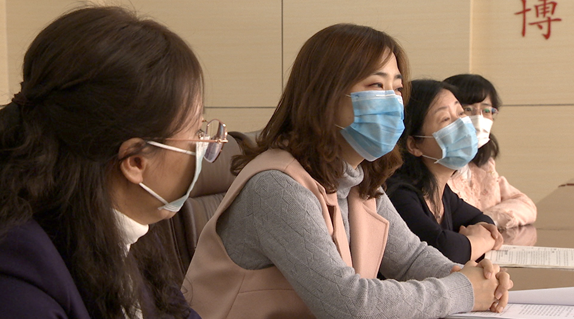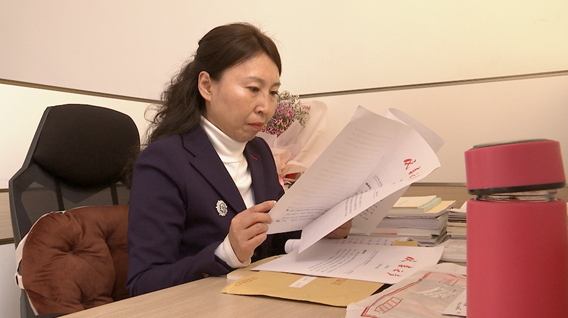03:24

The COVID-19 outbreak may have stopped classes, but that does not mean learning stops.
As the Chinese government delays the reopening of schools to curb the spread of the virus, public education has moved online.
In the northeastern city of Anshan, Guan Qijun, deputy to China's National People's Congress (NPC) and also a high school Chinese teacher, has been facilitating online education while the novel coronavirus keeps children at home.
For Guan, her top priority during the school closure is to figure out an appropriate way to continue delivering knowledge to her students.
Many parents have said their children sign up for online classes but do not pay attention at all. Guan said she and her colleagues are carrying out livestreaming lessons with proper supervision and evaluation.
"As you can see, while teaching a class I will ask questions, and check feedback via video contact, so they cannot just muddle through," she shared.

Guan Qijun gives classic Chinese literature class to her students online. /CGTN
Guan Qijun gives classic Chinese literature class to her students online. /CGTN
However, it was a big challenge in the beginning for most educators across the country like Guan to master online teaching in a very short time. At the top of the list of problems were technical issues and limited teaching resources.
"I always say that a handy tool does a good job, so we must first sharpen our tools even if it's painful." And Guan said they chose two teaching platforms after thorough consideration.
The teachers learnt from their family members first, then from each other, and received ongoing training to get the hang of the teaching platforms.
And as the head of Chinese literature teaching and research group at school, Guan Qijun organized the team to make full use of online teaching resources to prepare course work, tests and teaching videos ahead of schedule. Many of these high-quality materials are now used by other schools in Anshan.

Guan Qijun communicates with students and colleagues. /CGTN
Guan Qijun communicates with students and colleagues. /CGTN
Chinese teacher He Ping appreciate that Guan summed up the experience of each team and reported it to the whole group.
"We are told to integrate resources and make a report to share our special skills with the whole group. As for difficulties we have in teaching, they are addressed at every group meeting," said He. The teacher added that it had greatly helped them to get familiar with online teaching, which is very different from teaching in physical classrooms.
While preparing lessons, Guan Qijun is also busy preparing for the resumption of school in Liaoning Province slated for mid April, so as to smoothly transition from online to offline teaching. And as one of the national lawmakers, she will also bring suggestions she collected during the epidemic to the annual meeting of China's top legislature.

Guan Qijun reviews some documents. /CGTN
Guan Qijun reviews some documents. /CGTN
Motions include sharing knowledge of epidemic prevention and control, a ban on wildlife trade and identifying role models of epidemic control in primary and secondary schools in Chinese history and ethical education, which Guan herself have already put into action. For example, she encourages students to learn and openly write about the ongoing epidemic in writing contest.
"I update students on the epidemic day by day. They have deep feelings about what's going on, and are surprisingly willing to write articles about the virus, and even ask me for comments," said Guan.
After weeks of adjustments, Guan said students and their parents have now gradually accepted this new form of online learning.
She hopes the humanities course can help students cultivate good morals and civic awareness, and that the epidemic restrictions can be an opportunity to combine textbook lessons with real world learning, for students to broaden their horizon on life and the world around them.
(Cover image: Guan Qijun gives classic Chinese literature class to her students online. /CGTN)